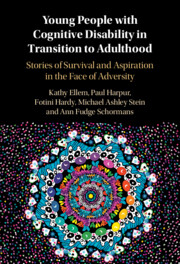 Young People with Cognitive Disability in Transition to Adulthood
Young People with Cognitive Disability in Transition to Adulthood Book contents
- Young People with Cognitive Disability in Transition to Adulthood
- Young People with Cognitive Disability in Transition to Adulthood
- Copyright page
- Dedication
- Epigraph
- Contents
- Figures
- Tables
- Preface
- Acknowledgements
- Chapter 1 Introduction
- Chapter 2 Violence against Young People with Cognitive Disability
- Chapter 3 Working in Partnership with People with Lived Experience
- Chapter 4 Amethyst’s Story
- Chapter 5 Experiences of Young People with Cognitive Disability
- Chapter 6 The Many Faces of Violence
- Chapter 7 Young People and the National Disability Insurance Scheme
- Chapter 8 Don’t Give Up on Us
- Chapter 9 Housing, Home, and Mental Well-Being
- Chapter 10 Young People’s Experiences of the Child Protection and Criminal Justice Systems
- Chapter 11 Having Someone in Your Corner
- Chapter 12 In the Voices of Participants
- References
- Index
Chapter 2 - Violence against Young People with Cognitive Disability
Published online by Cambridge University Press: 06 February 2025
- Young People with Cognitive Disability in Transition to Adulthood
- Young People with Cognitive Disability in Transition to Adulthood
- Copyright page
- Dedication
- Epigraph
- Contents
- Figures
- Tables
- Preface
- Acknowledgements
- Chapter 1 Introduction
- Chapter 2 Violence against Young People with Cognitive Disability
- Chapter 3 Working in Partnership with People with Lived Experience
- Chapter 4 Amethyst’s Story
- Chapter 5 Experiences of Young People with Cognitive Disability
- Chapter 6 The Many Faces of Violence
- Chapter 7 Young People and the National Disability Insurance Scheme
- Chapter 8 Don’t Give Up on Us
- Chapter 9 Housing, Home, and Mental Well-Being
- Chapter 10 Young People’s Experiences of the Child Protection and Criminal Justice Systems
- Chapter 11 Having Someone in Your Corner
- Chapter 12 In the Voices of Participants
- References
- Index
Summary
This chapter explores what we know about violence against young people with cognitive disability. It looks at what can make it more likely that young people with cognitive disability are abused. It’s hard to really know how many young people with cognitive disability have experienced violence. Young people with cognitive disability can be harmed by workers, family, or friends who are meant to help them. Abuse can happen in many places. Services and society need to learn how to keep young people with cognitive disability safe. We need to make sure young people can make decisions for themselves.
Keywords
- Type
- Chapter
- Information
- Young People with Cognitive Disability in Transition to AdulthoodStories of Survival and Aspiration in the Face of Adversity, pp. 22 - 39Publisher: Cambridge University PressPrint publication year: 2025
